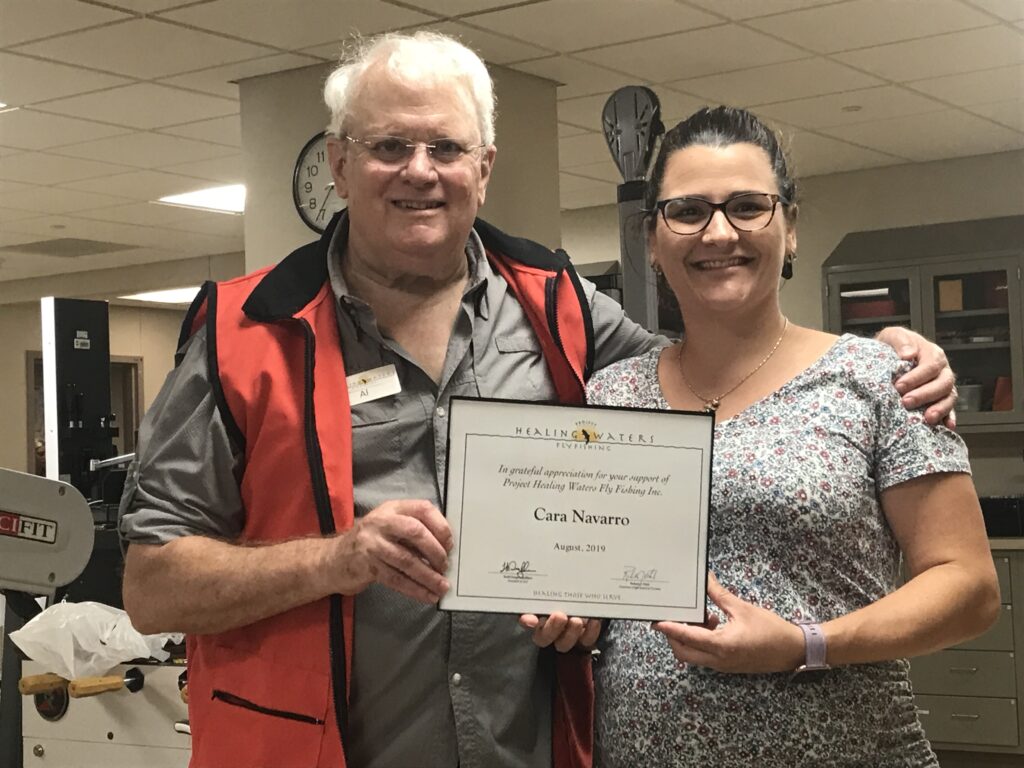NEWS & STORIES
Project Healing Waters Walter Reed Program Recognizes Outstanding Clinical Support
By: Bryce A. Benson
September 4, 2019. Walter Reed National Military Medical Center, Bethesda, MD: An indispensable component to a wounded warrior’s recovery is the support of a provider who understands the physical and emotional challenges of their patients and adds to their care with meaningful activities. This defines Cara Navarro, a Certified Therapeutic Recreation Specialist, in the outpatient Occupational Therapy clinic at Walter Reed. For nearly a decade Cara has supported our wounded warriors. Partnering with Project Healing Waters Fly Fishing, Cara has referred countless patients to weekly meetings and fly-fishing expeditions around the greater Metro DC area. Her engagement with the Walter Reed Program is very visible as she attends each session to check on how her patients are benefiting from the program. For patients who have sustained physical injuries, tying flies and casting can be a real challenge. Cara works hand in hand with Project Healing Waters volunteers to develop adaptive equipment to make routine tasks easier so they fully participate in all events. The benefits for her patients and alignment with Project Healing Waters does not stop within the OT clinic. Recently Cara expanded our program to teach fly tying to patients at the National Intrepid Center of Excellence (NICoE).
Located adjacent to the Walter Reed National Military Medical Center, and founded in October 2010, NICoE is the Nation’s premier treatment center for our wounded warriors who have suffered Traumatic Brain Injury and Psychological Health concerns. Those who attend the Intensive Out-Patient program receive world class traditional medical treatment, but also non-traditional approaches to healing such as meditation, acupuncture, nutritional planning, music and art therapy. Cara found an immediate opportunity to provide an additional healing opportunity – fly-tying. She personally instructs fly tying classes, “I turn a lot of heads when I show up to teach a lesson”, Cara once joked as she is 33 weeks pregnant, but also admits that most of the wounded warriors expect an old guy to show up and teach them how to tie a wooly-bugger. Tying flies engages many functions of our brain, develops fine motor skills and improves hand-eye coordination. In addition to the art of combining thread with deer or elk hair, hackle, and chenille into something which looks like a “fly”, the science cannot be overlooked. So Cara works the science into each lesson. “Fish are smart, and if you do not mimic the natural environment, then their flies might not catch fish.” Cara discussed with a Project Healing Waters participant as she collected material for an upcoming session.
Monthly, Cara arranges transportation to the Armed Forces Retirement Center in Washington D.C. (where President Lincoln penned the Emancipation Proclamation) so Project Healing Waters participants get to test their fly tying and casting skills on a small pond that is well stocked with bluegill and largemouth bass. After a couple hours fishing, they share stories while eating hamburgers and brats cooked by the Assistant Program Lead Hank Pitcher. “Cara is an integral member of our team and we are very thankful for all that she does for us.”
To recognize her support of our wounded warriors while incorporating the healing aspects of fly fishing, Walter Reed’s Program Lead Al Warner presented Cara with a Certificate of Achievement. “Few match Cara’s dedicated service and our program would not be able to support as many of our wounded service members and veterans without her”. The partnership among Project Healing Water’s volunteers, participants, and medical providers is a testament to the benefits that fly fishing offers to our wounded warriors. As Al said, “We are lucky and extremely thankful to have Cara as a member of our team.”
For more information on the National Intrepid Center of Excellence, please visit: https://www.wrnmmc.capmed.mil/NICoE/SitePages/index.aspx.
